#children advice
Explore tagged Tumblr posts
Text
So, about siblings relationships...
You can take this either as reference for writing if you're an only child or life advice if you have/are going to have children or, in case your experiences are similar to mine own, to nod with your head in agreement. Either way, a few things to know about siblings relationships I sometimes think about:
1. Someone can hate their siblings and still not want to hurt them.*
So you know how love and hate can coexist in romantic relationships and parent-child relationships? That applies to siblings too. They're people who had been in your life for ages, people who everyone and their teachers' grandmothers will tell you have to love and care about. They're also pelople who can be no compatible at all with yourself. They're people who most likely had hurt you many times and didn't stop even when you cried and yelled at them. They're people who were growing along with you, so they were inmature and so were you. Of course, in most cases both parts ended up hurting each other.
In some cases, you might feel like they don't care at all about you and in some cases you won't get to know if they do or not. Because as much fun as you can have with them, they can switch fast and tell you the worst things at the next moment. And so you doubt to be vulnerable with them. Some siblings have their own little things they do for each other or together and that may felt like a reassurance sometimes.
2. Parents (or whatever the guardian figure is) have a big part in molding their relationship.
Siblings relationships are one of those relationships where things don't depend on just them until they're grown adults. Because, you know, that's the age where people have normlly reached a certain level of maturity and can reflect on themselves and situations without a mediator, but also because the parent is out of the equation (as in, won't meddle to tell you what to do or, if they do, you don't have to hear them. Not that they're dead. Tho thy could be).
Parents are the ones who teach (or not) how to resolve conflicts and are very important for children's feelings. If everytime the children fight the parent, let's say, interrupts, doesn't let them explain their sides, and forces the easiest kid to apologize because is the fastest "solution", there's going to be a bad dynamic. The "easy kid" is going to grow to be easy to push and or resented, and the other one, the "difficult kid" or the "stubborn one" is, obviously, going to grow to believe they don't have to apologize (or have a hard time with it) or believe they're always in the right. That's going to be a huge problem in the future.
If the parent, let's say, interrupts the conflict, listens to both parts (even if they know what happened, children feel better when they feel listened and not discarded**) and searches for a solution while explaining what was wrong and what not, then tells them to apologize, the little fight is going to stay as a little fight. Water under the bridge. No unhealthy dynamic induced. Plus, they learn real conflict solution skills.
Of course, that doesn't guarantee that they will have a good relationship for the rest of their lives or that an external factor won't affect them negatively. But parents have a great power in laying the foundations of their children's relationships and dynamics. Being lazy about it or rushing it could mess them up badly.
Alternatively, kindergarten teachers and teachers of younger students*** also can influence the children's relationships and dynamics. If they're doing their job right, it's going to be positive. If not, it's going to add into the conflict.
3. A bad relationship doesn't necessarily have to come from a single big fight.
It can also come from little things that went summing up with time, from growing negative emotions and bottle up feelings, from insults never taken back and repeated offenses. It can be an emotional gap you let extend so the other wouldn't hurt you as much as they did. It can be a gap you didn't notice was there until years later, when you stopped and realized there's no closeness, you have no idea what the person in the other side is thinking or who they are.
It also can be the last straw and an outburst of anger and tears. The last time they told the other to fuck off before they started to let go of them.
It can be talking at them as if they were the siblings they're supposed to be but never telling them what you actually feel. Smile and wave and pretend you aren't just done with them.
*Mostly for fiction stuff, but also so you have an idea about other sibling dynamics: if there's people who hate their siblings and doesn't want to hurt them, but know they can't be vulnerable with them, people who actually like their siblings can not want to hurt them without it being "unrealistic siblings". I know because I hate my sisters most days than not and still not want to hurt them. I hate to hurt them so bad that I learned to control my anger outbursts by myself (tbh, I'm quite proud of that. I've been worked in that since I was a kid and finally succeded at my teenhood) so I wouldn't blink and have punched them no matter what they told me. But my brother is actually neat in a friendly Soos Ramirez way. He's my favorite, I'd hate to hurt him even more.
**Please let your child talk. Being told to shut up everytime something happens is awful and only teaches you that your opinion doesn't matters, no one cares, and gives you reasons to believe you can't count on your parents.
Explaining your side of the story (or just what happened, if there are no sides), the few times that happened to me (lol), feels like a knot on your chest untying by itself. The children can still be exalted when trying to explain, that's how children are, but they'll feel better after.
***I guess this could apply to teenagers, but teens are less prone to listen to their teachers. You'd have to be more creative. Like assigning literature that makes them reflect, which you should do anyways so ¯\_(ツ)_/¯.
#haha sibling issues am i right?#when i say that adults can mold their children's dynamic i mean it#if you can say i was the easy kid#yeah occasional anger outbursts and all#I'm pretty sure everyone in my family has or has had anger issues except maybe my brother#they didn't teach us to manage it (which makes sense since they never acknowledge their own)#so learning to manage them in my own without telling my family anything was quite hard#specially bc they're the kind that if you tell them to stop they're going to say you can't take jokes and be worse about it#anyways#siblings advice#children advice#writing advice#of course not all sobling relationships are as despicted above#this also could count as a rant i guess#only one sorby has been hurt in the making of this post#does my family know how much conflicting feelings i have about them? absolutely no#am i going to tell them? i don't think so#my dogs and my brother are the only safe ones
1 note
·
View note
Text
Writing Notes: Children's Dialogue
Language is extremely complex, yet children already know most of the grammar of their native language(s) before they are 5 years old.
BABBLING
Babbling begins at about 6 months and is considered the earliest stage of language acquisition
By 1 year babbles are composed only of the phonemes used in the language(s) they hear
Deaf babies babble with their hands like hearing babies babble using sounds
FIRST WORDS
After the age of one, children figure out that sounds are related to meanings and start to produce their first words
Usually children go through a holophrastic stage, where their one-word utterances may convey more meaning
Example: "Up" is used to indicate something in the sky or to mean “pick me up”
Most common first words (among the first 10 words uttered in many languages): “mommy,��� “daddy,” “woof woof,” “no,” “bye,” “hi,” “yes,” “vroom,” “ball” and “banana”
WORD MEANINGS
When learning words, children often overextend a word’s meaning
Example: Using the word dog to refer to any furry, four-legged animal (overextensions tend to be based on shape, size, or texture, but never color)
They may also underextend a word’s meaning
Example: Using the word dog to refer only to the family pet, as if dog were a proper noun
The Whole Object Principle: When a child learns a new word, (s)he is likely to interpret the word to refer to a whole object rather than one of its parts
SYNTAX
At about two years of age, children start to put words together to form two-word utterances
The intonation contour extends over the two words as a unit, and the two-word utterances can convey a range of meanings:
Example: "mommy sock" = subject + object or possessive
NOTE: Chronological age is NOT a good measure of linguistic development due to individual differences, so instead linguists use the child’s mean length of utterance (MLU) to measure development
The telegraphic stage describes a phase when children tend to omit function morphemes such as articles, subject pronouns, auxiliaries, and verbal inflection
Examples: "He play little tune" or "Andrew want that"
Between 2;6 and 3;6 a language explosion occurs and children undergo rapid development
By the age of 3, most children consistently use function morphemes and can produce complex syntactic structures:
Examples: "He was stuck and I got him out" / "It’s too early for us to eat"
After 3;6 children can produce wh-questions, and relative pronouns
Sometime after 4;0 children have acquired most of the adult syntactic competence
PRAGMATICS
Deixis: Children often have problems with the shifting reference of pronouns
Children may refer to themselves as "you"
Problems with the context-dependent nature of deictic words: Children often assume the hearer knows who s/he is talking about
AUXILIARIES
In the telegraphic stage, children often omit auxiliaries from their speech but can form questions (with rising intonation) and negative sentences
Examples: "I ride train?" / "I not like this book"
As children acquire auxiliaries in questions and negative sentences, they generally use them correctly
SIGNED LANGUAGES
Deaf babies acquire sign language in the same way that hearing babies acquire spoken language: babbling, holophrastic stage, telegraphic stage
When deaf babies are not exposed to sign language, they will create their own signs, complete with systematic rules
IMITATION, REINFORCEMENT, ANALOGY
Children do imitate the speech heard around them to a certain extent, but language acquisition goes beyond imitation
Children produce utterances that they never hear from adults around them, such as "holded" or "tooths"
Children cannot imitate adults fully while acquiring grammar
Example:
Adult: "Where can I put them?" Child: "Where I can put them?"
Children who develop the ability to speak later in their childhood can understand the language spoken around them even if they cannot imitate it
NOTE: Children May Resist Correction
Example: Cazden (1972) (observation attributed to Jean Berko Gleason) – My teacher holded the baby rabbits and we patted them. – Did you say your teacher held the baby rabbits? – Yes. – What did you say she did? – She holded the baby rabbits and we patted them. – Did you say she held them tightly? – No, she holded them loosely.
Another theory asserts that children hear a sentence and then use it as a model to form other sentences by analogy
But while analogy may work in some situations, certainly not in all situations:
– I painted a red barn. – I painted a barn red. – I saw a red barn. – I saw a barn red.
Children never make mistakes of this kind based on analogy which shows that they understand structure dependency at a very young age
BIRTH ORDER
Children’s birth order may affect their speech.
Firstborns often speak earlier than later-born children, most likely because they get more one-on-one attention from parents.
They favor different words than their siblings.
Whereas firstborns gabble on about animals and favorite colors, the rest of the pack cut to the chase with “brother,” “sister,” “hate” and such treats as “candy,” “popsicles” and “donuts.”
The social dynamics of siblings, it would appear, prime their vocabularies for a reality different than the firstborns’ idyllic world of sheep, owls, the green of the earth and the blue of the sky.
MOTHER'S LEVEL OF EDUCATION
Children may adopt vocabulary quite differently depending on their mother’s level of education.
In American English, among the words disproportionately favored by the children of mothers who have not completed secondary education are: “so,” “walker,” “gum,” “candy,” “each,” “could,” “wish,” “but,” “penny” and “be” (ordered starting with the highest frequency).
The words favored by the children of mothers in the “college and above” category are: “sheep,” “giraffe,” “cockadoodledoo,” “quack quack,” the babysitter’s name, “gentle,” “owl,” “zebra,” “play dough” and “mittens.”
BOYS / GIRLS
One area of remarkable consistency across language groups is the degree to which the language of children is gendered.
The words more likely to be used by American girls than by boys are: “dress,” “vagina,” “tights,” “doll,” “necklace,” “pretty,” “underpants,” “purse,” “girl” and “sweater.”
Whereas those favored by boys are “penis,” “vroom,” “tractor,” “truck,” “hammer,” “bat,” “dump,” “firetruck,” “police” and “motorcycle.”
Tips for Writing Children's Dialogue (compiled from various sources cited below):
Milestones - The dialogue you write should be consistent with the child's developmental milestones for their age. Of course, other factors should be considered such as if the child has any speech or intellectual difficulties. Also note that developmental milestones are not set in stone and each child is unique in their own way.
Too "Cutesy" - If your child characters are going to be cute, they must be cute naturally through the force of their personality, not because the entire purpose of their existence is to be adorable.
Too Wise - It’s true kids have the benefit of seeing some situations a little more objectively than adults. But when they start calmly and unwittingly spouting all the answers, the results often seem more clichéd and convenient than impressive or ironic.
Unintelligent - Don’t confuse a child’s lack of experience with lack of intelligence.
Baby Talk - Don’t make a habit of letting them misuse words. Children are more intelligent than most people think.
Unique Individuals - Adults often tend to lump all children into a single category: cute, small, loud, and occasionally annoying. Look beyond the stereotype.
Personal Goals - The single ingredient that transforms someone from a static character to a dynamic character is a goal. It can be easy to forget kids also have goals. Kids are arguably even more defined by their goals than are adults. Kids want something every waking minute. Their entire existence is wrapped up in wanting something and figuring out how to get it.
Don't Forget your Character IS a Child - Most of the pitfalls in how to write child characters have to do with making them too simplistic and childish. But don’t fall into the opposite trap either: don’t create child characters who are essentially adults in little bodies.
Your Personal Observation - To write dialogue that truly sounds like it could come from a child, start by being an attentive listener. Spend time around children and observe how they interact with their peers and adults. You can also study other pieces of media that show/write about children's behaviour (e.g., documentaries, films, TV shows, even other written works like novels and scripts).
Context - The context in which children speak is crucial to creating realistic dialogue. Consider their environment, who they're speaking to, and what's happening around them. Dialogue can change drastically depending on whether a child is talking to a friend, a parent, or a teacher. Additionally, children's language can be influenced by their cultural background, family dynamics, and personal experiences. Make sure the context informs the dialogue, lending credibility to your characters' voices.
Sources and other related articles: 1 2 3 4 5 6 7 8 9 10
Writing Notes: On Children ⚜ Childhood Bilingualism More: Writing Notes & References ⚜ Writing Resources PDFs
#writing prompt#writeblr#writers on tumblr#spilled ink#poets on tumblr#writing notes#children#writing tips#literature#writing advice#writing reference#studyblr#langblr#linguistics#dark academia#dialogue#writing resources
4K notes
·
View notes
Text
Fantasy Guide to Royal Children - Heirs and Spares
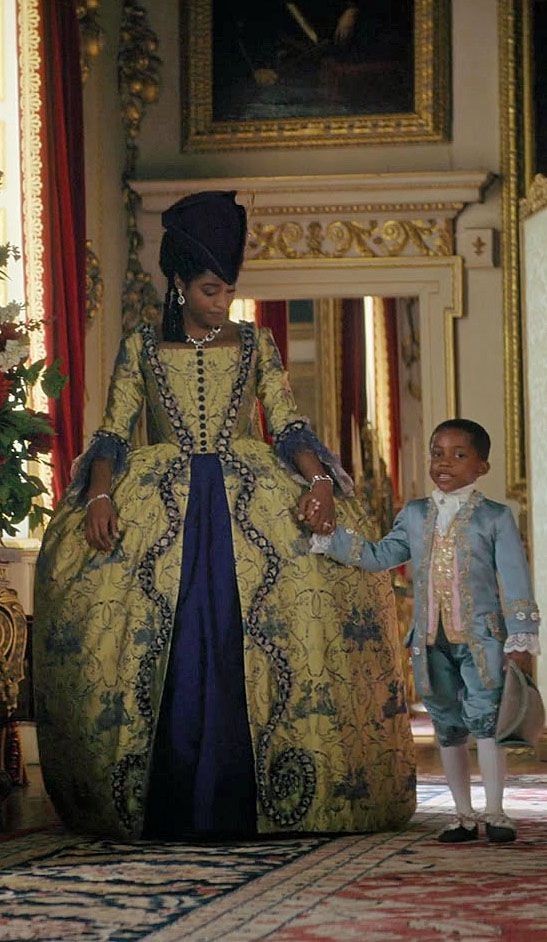
The lives of Princesses and Princes are of interest to most fantasy writers, it's where many of our heroes, side characters and antagonists hail from. But what is there life like? Is it always ballgrowns and servants? Or something more?
A Strict Order of Precedence

The first thing to know about royal children and siblings is that there's a very strict precedence of importance. Is it fair? No. But this is a system, it doesn't have to be fair. The heir comes first without argument. They are the most important child, they are always greeted first, they are the one to stand next to the monarch or their parents at occasions, they literally go first - and this doesn't change with age, if the heir is the youngest, they still have precedence over their siblings. After the heir, order of predence goes by age and the order effects the life of the children. For example, the older sister will marry begore any of her sisters. This order of deference will be so engrained in your character's life that they will believe it the norm and rarely question it, it probably won't spark any in-fighting.
Accommodation & Staff

Royal children are usually raised one of two ways. Either they are raised at court, in the same Palace as their parents or they are raised away from court under the care of trusted servants. Being raised away from their parents isn't a sign of remoteness or dislike or terrible parenting, it was a way of break a child into the constraints of royal life while giving them freedom of scrunity or danger. Usually these children are raised in the countryside for their health, as cities are usually cesspits for disease. Their parents would come to visit them or allow them to visit them at court. Children raised at court are raised with a higher level of scrunity and attention. They will be in the public eye.
Royal children will always be surrounded by staff. There will be nurses to wash and dress them, nannies to discipline and direct them, guards to protect them and usually, a guardian known as a governess to run their household and care for their needs. Staff are not allowed to hit royal children and must obey their commands. Some royal children were very close to their staff:
Kat Ashley and Elizabeth I
Baroness Lehzen and Queen Victoria
Klementy Grigorievich Nagorny and the Tsarevich Alexei Nikolaevich
Lala Bill and Prince John
However, some royal children faced neglect from their staff. George VI was abused by his nanny, who would pinch him during important occasions, openly favour his elder brother over him and deny him food, which many have been a cause of his speech impediment. After the Russian Revolution, another of the Tsarevich's nannies proved less loyal than the other. Andrei Yeremeyevich Derevenko abandoned his charge, but not before ordering the boy around and insulting him.
Day to Day Life

Royal children would be educated withing their home by tutors. They would usually take lessons all together (the heir may take other lessons). A royal child would recieve an education in languages, arithmetic, geography, etiquette, dancing, music, sports such as riding and literature. Sometimes they would even share lessons with the children of trusted nobles or their cousins. Only the heir will be taught statecraft and how to reign. There is no rhyme nor reason a spare would learn how to rule.
Some royal children are taught the value of their position. Many royal children will be raised strictly to adhere to their social standing and their place in it. Some children may be raised in isolation, kept from mingling and raised to think of themselves as higher than those around them. Some royal families preferred to raise their children as "normal" as possible. The last Romanov children slept in camp beds, with no pillows and we're expected to tidy their own rooms and help the servants. They didn't even use their proper titles, they were called by their names and given a tight monthly allowance to spend. Alexandra of Denmark and her sisters used to make their own clothes. Some royal children could even be encouraged to play with the children of servants and staff as well as nobility (Kolya Derevenko and Tsarevich Alexei Nikolaevich, Winifred Thomas and Prince John). Companionship was a great honour for noble and common child alike as sometimes, they would be invited to live or be educated alongside by the royal children.
Royal children will not undertake royal duties until they are of age. Younger children be be present for large scale events such as jubilees but would not be expected to partake in any duties themselves. When they are of age, they will usually be granted an annual allowance, be invited to social events, invited to be patrons of charities and participate in royal duties.
Heir Vs Spare
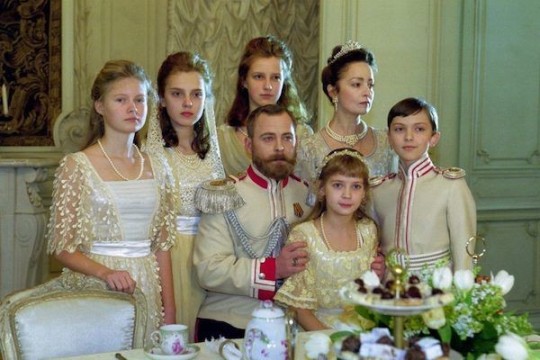
Heirs have more responsibility, all the prestige, more power but they have less freedom, less room to explore their own lives and be expected to always be the epitome of perfect. Heirs will be given responsibilities in government, sitting in on state meetings or undertaking state duties.
Spares have little in the way of real power but have the ability to live less regimental lives and gave more agency in their personal lives. Spares may act as ambassadors to other nations or undertake state visits on behalf of the monarchy or even take positions in the army. Spares are encouraged to find positions to support themselves outside the family, either in a marriage or undertaking some service to the country. Spares who stay in the country, tend to act as unofficial advisers to their sibling when they become monarch.
All Grown Up

When royal children grow up, there are usually certain expectations and limitations.
Heirs will be married quickly, the lineage must be secure. Heirs will usually marry either as part of a political alliance or marry somebody suitable - from a good family, the right background, and able to fit into a certain mould (i.e malleable, amiable and loyal). They will be expected to focus on the country, it's needs and support the monarch at all times. Their social circles will be scruntised, their every move will be noted and remarked upon. Heirs will never gave to worry about funding their lifestyle, the Crown is their job and it supports them.
Spares can marry or remain single if they choose, (but if the monarch instructs them go marry they must). Spares can travel, they can be idle, they can even persue amusements not permitted for the heir. Spares can win glory on the battlefield and mix with all sorts of people. That isn't to say spares are useless, spares often occupy very important spaces in society and government. Spares will usually take these positions not for just status but also for the pay. This is why spares are granted royal titles such as dukedoms (they can make money off the lands, be able to build a dynasty for themselves and their heirs and gain status).
#Fantasy Guide to heirs and Spares#Fantasy Guide to Royal Children#Fantasy Guide#write#writing#writeblr#writing resources#writing reference#writing advice#writers#writing advice writing resources#spilled ink#Writing reference writing resources#Writing resources writing reference#Writing advice writing reference#Writing advice writing resource#Royal children#Writing royal characters#Royalty#Writing royalty#Writing royals
3K notes
·
View notes
Text

#I'll be a skibidi toilet defender until the day i die idc#it's one of the few pieces of media that gen alpha enjoys that isn't taking advantage of them for advertising or marketing purposes#it's just an indie animation made by some guy and I'd take it over shit like cocomelon that's purposely overstimulating children for profit#the legend of zelda#loz#tloz#ganondorf#good advice ganondorf#good advice#young zelda#princess Zelda#link#young link#skibidi toilet
850 notes
·
View notes
Text

212 notes
·
View notes
Text

Scenes from The Baby Wars Part One: The First One
[Hibrides never wanted to be a mother (though the concept of childbearing has always occurred to her as 'inevitable and necessary'), underwent very severe post-partum depression, never really bonded with the infant, and was extremely uncomfortable with nursing her (they had a wet nurse who covered most of it).
Brakul ended up being the Designated Housewife throughout Erubi's infancy and was effectively the only member of the household providing parental care, was Extremely bitter with Hibrides for not really wanting anything to do with her daughter (among other things), and was raised in a context where fathers allowing their infants to comfort nurse on them is a standard practice (which is not widely conceptualized as a Thing men can do in the Wardi cultural sphere and comes off as bizarre to the rest of his household).
These combined factors lead to tense standoffs where he looms behind Hibrides trying to guilt her into Feeding The GodDamn Baby while looking, from her perspective, like he's trying his absolute hardest to breastfeed.]
#(Not treating men comfort nursing as a joke here btw I think it's fucking absurd that people get freaked out about it#Completely normal thing to do. Not weird or gross.)#Hibrides bonded with both of her children more when they got older and started walking and talking and being unavoidable but#she's never felt like a mother ''''should'''' and feels a heavy background layer of Gnawing Guilt about it#She was very close with her own mother (who had a pretty good marriage) so a lot of the advice she got was like#that these things take time and patience and a lot of pain but Someday she'll settle in and be happy with her husband and kids and etc#And now she's like 'well I no longer feel like I'm going to fucking hurl with terror when I notice my features in my daughter's faces.#And my husband and I sometimes go on hunting trips alone where we verbally abuse each other in ways that Almost come#full circle into being friendly banter. Is this it. Is this how it's supposed to be. Have I Fucking Made it.'
164 notes
·
View notes
Photo


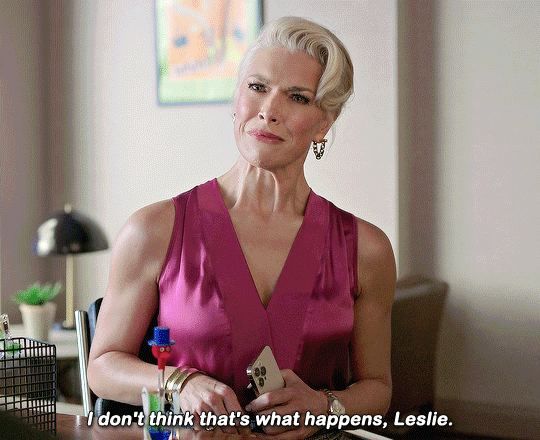

I just need some advice. Oh. Keeley didn't text you back? She did not. Ted? Can't find him. Sassy? On a plane with no Wi-Fi. How about your mother? Are you fucking with me? I am flattered. Okay, let's do this shit.
#Ted Lasso#tedlassoedit#tedlassosource#Hannah Waddingham#Jeremy Swift#Higgins continue to be the funniest guy#the face he makes when he says 'those children are dead' kills ME#also he always gives the best advice#usernessa#tuserliliana#nessa007#userkk#usergiu#scratchybeardsweetmouth#trueloveistreacherous#uservalentina#usersydney#usershaysh#userbadger#userk8#ohtendril#userbbelcher#tvandfilm#my stuff#mine: believe#ted lasso spoilers
2K notes
·
View notes
Text
how to write children's personalities
(this is part of my series, how to write children in fanfiction! feel free to check it out if you want more info like this!)
this is the main aspect of writing children that i see people mess up so often, especially in the fandoms i'm in (sanders sides and undertale). children are not adorable little noodles with no brains and no concept besides being cute and silly and crying. children are beings that are just as complex as adults, and they deserve personalities to match. this will make them way more interesting to read about! let's get started!
since there are so many aspects to personality to talk about and i don't want to sit here typing for ten years, we're going to do this guide a little differently. i'm going to divide these issues into archetypes, write a short description, and then make a list of do's and don't's for each one!
archetype one: the cute little baby
okay. babies are cute. we all know this, and i'm not saying it's a bad thing to make your babies cute. a lot of people love reading about moments with adorable little babies. but here are some ways to step this kind of thing up, and some things to avoid if you want to improve upon writing this archetype.
do's:
give the child character another archetype besides this one. though "cute" is the foundation for a lot of child characters, it's not a personality. and if a character is vital to your story, then it needs a personality. that's just a rule. you will read more about other archetypes further along in this post!
make the moments symbolic. though it doesn't seem like it from an outsider's perspective, basically everything a baby does is for a reason, and every action a baby makes can say something about their personality. if you want this baby's personality to be energetic and curious, have them crawl around and explore things, and laugh a lot, and babble. if you want this baby to be more sullen and shy, have them cry quietly instead of wailing, or have them squirm when being held by new people.
make the actions of the baby's guardians affect the mannerisms of the baby. babies act differently depending on how the people taking care of them act and react. for instance, if the baby's guardians are very busy people, then maybe have the baby cry very loudly whenever they want something, since they know that it's the only way to get the attention of their guardians. stuff like that can add depth to a character and to a general story.
don't's:
decide that the baby is cute and call it a day. sweet little babies are cool and all, but they get very boring to read about after a while. this can barely even be considered an archetype because of how bland it is when it's by itself.
keep this archetype around for too long. as babies turn into toddlers and then children, they don't act even remotely the same way. it's strange and off-putting to read about a seven year old acting like a two-year old, unless it's a very clear character choice that is a result of explicit actions and events.
make the baby know that it's cute. realistically, children don't understand the concept of cuteness until they're around toddler age. if then, you want to make the kid be like "i get what i want when i'm cute, so i'll act cute!", then sure, that's hilarious. but when they're two months old, they're not batting their eyelashes because that's their personality. they're batting their eyelashes because they got something in their eye. the main thing that makes a baby cute is that they don't know they're cute. they're just figuring out how to do ordinary things.
make everything a cute moment. while babies are awesome, raising them isn't always sunshine and rainbows. make the baby do something wildly chaotic, because babies do wildly chaotic things all the time. not only does this make things more realistic, but it makes things very interesting!
archetype two: the shy kid
as a former shy kid, i know good and well that these types of children exist, and they are very real and valid. however, there are certain ways i've seen them written that are just terrible because once again, this archetype cannot be considered a full personality on its own. let's get into the do's and don't's.
do's:
make their shyness a deliberate choice. kids aren't usually naturally shy. kids are usually more curious than cautious. is there a reason why the kid is shy? there doesn't have to be a reason why the kid is shy, but there could be a reason why the child is NOT outgoing/curious. try and give something like this some deliberate cause, instead of just making them shy so they can seem more precious and infantilized.
make their shyness manifest in diverse ways. not all shy kids cling to their guardian's leg and sit alone during recess. there are different ways to be shy. you can be aggressively shy, or fearfully shy, or shy due to general unwillingness to change.
make their shyness have realistic consequences. someone who's shy is probably not going to have many friends, if any. not all shy kids magically meet an extrovert who adopts them. someone who's shy probably has underdeveloped social skills, which can lead to them being less emotionally intelligent down the line. this makes the shy kid archetype a lot more three-dimensional than just a wet noodle of fear.
don't's:
infantilize shyness or treat it like it makes the kid some sweet, precious angel. not only is this very uncomfortable for shy people to read, but it's generally unrealistic. shyness doesn't affect how good or bad somebody is - it's a neutral trait.
use shyness as a tool to make characters seem younger. shyness does not indicate age. fear manifests in many different ways, and shyness is not the only way.
rely on cliches. not all shy people have the same journey, and the idea that a shy person becoming more outgoing is the "goal" is not only a bit offensive, but it's very cliche. shyness is not always an obstacle to be overcome.
archetype three: the happy-go-lucky kid
oftentimes, the reason why children characters are written into stories in the first place is to give a little bit of lightheartedness and innocence. to add a unique voice among all the cranky, stingy, burdened adults. but you have to be careful when writing this archetype. i personally really dislike this archetype as a whole, but i'm going to put personal feelings towards it aside because honestly, there's no valid reason to dislike it besides opinion.
do's:
give the kid a trademark. maybe this kid makes a lot of little jokes, or maybe they always see the best in a situation. give the kid one thing that makes them happy-go-lucky instead of just giving them everything because nobody is endlessly happy all the time in every way.
go deeper. while happiness is very often genuine, sometimes, it's a mask that hides something else. this can be an interesting way to sort of spice up your happy-go-lucky kid character. maybe the kid is hiding a big secret behind all those jokes.
don't's:
make the character always happy. while children tend to have simpler thoughts, they don't have simpler minds. this child needs to have thoughts, real, genuine thoughts that aren't just happy things.
see happy-go-lucky as a trait that is exclusive to children. comparing happiness to childhood and viewing them as the only places where the other can exist is just wrong, and it's kind of depressing. maybe give happy-go-lucky kid a happy-go-lucky adult to exchange jokes with!
---
those are the archetypes that i see a lot. but now, i'm going to suggest a few child character archetypes that i LOVE that i don't see enough in fics! feel free to use any of these that you like. alter them, combine them! these are, in my opinion, some of the most fun child character personalities!
the spoiled brat: "i want this, and that, and that, and- why aren't you giving it to me?? if you don't give me what i want, i'll tell on you!". spoiled brats are so fun to read and write about, especially when they have absolutely no reason to be spoiled given the current situation (think riches to rags). they've got everything, humor, angst, and best of all, lots of pockets for personality. think about why the child is spoiled. were they enabled by their guardians? did they grow up rich, with access to everything they wanted? think about whether you want the child to stay spoiled. does something change? do they learn how to improve their materialistic and selfish tendencies? there are so many opportunities to play with the personality of this child!
the know-it-all kid: while i do see a lot of know-it-all kids in media, oftentimes, they don't actually have personality besides bossiness and intelligence. i love know-it-all kids who have depth to them. kids who are constantly spouting information because of their sheer love to learn. kids who have one specific thing that they know everything about, so they never stop talking about it. kids who tell people what to do and act like they know best because they don't have a lot of control over anything at home, so they grasp at whatever control they can find elsewhere. i think this archetype could open up a lot of ideas for personality further down the line. it also has a lot of variety with humor and angst, and general depth.
the serious child: this is an archetype that i cannot get enough of. i love a child that doesn't think they're an adult, per se, and still enjoys kid things, but just has such a calm and regal air about them that isn't learned. it's just natural. think of the kid that doesn't really get excited about things conventionally, but you can tell they're happy by their faint smile. the kid that seems to live in slow motion, and doesn't mind this fact at all. the kid that sits alone at recess just because other kids scare the birds away, and they want to see how a bird acts when it doesn't think its being watched. i love kids who have poignant thoughts, because their thoughts are so creative and different from adult thoughts.
the adult-ified child: now this is another archetype i can't get enough of, but it's for a different reason. this child, on the other hand, does think that they're an adult for one reason or another. maybe their guardians forced them to grow up too quickly. maybe they just wanted to grow up quickly by themselves. but this child has thoughts that are too big for their little bodies. they explore things that aren't meant to be explored when their brains are still so small. they do everything too quickly, they stumble through life as if a clock is ticking somewhere. to me, they're just haunting to read about. it feels wrong and dangerous to just watch them do things that hurt them because they don't know any better, but they're on a page. nobody can stop them. it's just so tragic, i'm obsessed.
the prodigal child: this archetype isn't really as deep or detailed as the others, but i do appreciate it. this archetype is for a child who knew who they wanted to be from an early age. a child who wanders into a ballet class and finds out they're better than the ten year olds by the time they're five. this archetype often pairs really well with the know-it-all kid or the adult-ified child because usually, children don't experience what it's like to be the best at something until they're a lot older. this is just a really cool archetype when you aren't quite sure what to do with that main character's little sister.
the chaotic child: this archetype is so much fun to read and write, to be honest. this is a child that just does as they please, whether it's out of curiosity or for pure enjoyment. think of the crazy stories that your guardians have about you or your siblings being absolutely insane. scribbling in a book and then demanding that the library publish their version. trying to ride the dog like a horse. cutting up clothes in an attempt to be a fashion designer. this one is just plain fun!
---
now, there are so many more archetypes out there, but those are just my spotlights and recommendations! i hope after reading this, you feel more equipt to write child characters that have real, engaging, interesting personalities!
#not sanders sides#ez's writing#how to write children#how to write#writing#writing tips#writing guide#writing advice#writing resource#writing resources#personality#writing personality#do's and don't's#cliches#avoiding cliches#characterization#character concept#character tropes#character traits#character help
1K notes
·
View notes
Text
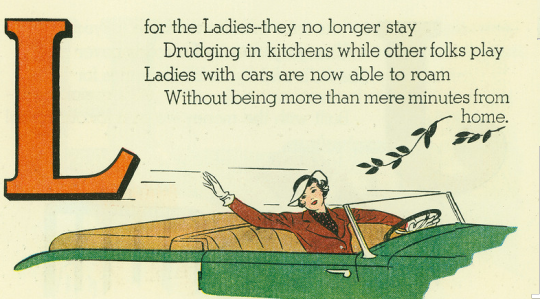
~ Your Highway ABC Book, by Jay H. Williams, 1935
#ABCs#vintage#vintage advice#vintage children's book#advice for ladies#1935#1900s#please don't drive like this#remember to steer and look where you're going
102 notes
·
View notes
Note
Nanami ver of bsf upstaging bf?? ❤️
listen… i meant what i said when nanami is just as bad, if not worse when it comes to driving your boyfriend away/upstaging him... maybe his tact makes him a better man than satoru, but you could also argue that it doesn’t; you could argue that kento is is only as respectful as necessary and consciously pushes boundaries, whereas satoru just does!! he just IS!! satoru IS overbearing and knows no consequence, but kento is not and he is very aware that evert action has a consequence, but he weighs it, determines it’s worth it, or—arguably worse—determines that the threat of your boyfriend getting mad or figuring him out isn’t high enough. kento is premeditated murder, he is going to drive your boyfriend so insane, to a place where he fully believes he cannot compete where he cannot compares, and kento will not feel bad about it. so, i rest my case, vice president of the not shit club, and their children are NO better!!
also, having been friends with kento sets a bar that your past and/or current boyfriend must quickly learn to meet, and more often than not, they don’t even come close. why go on random dating-app dates when kento sends food to your house just because he had an inkling you were sad (you texted him in a certain way that tipped him off). dates meeting you halfway at a restaurant/bar isn’t nearly as flattering when kento drives an hour in heavy rain and traffic after work to pick you up, just to make good on seeing a movie you told him you were excited about. expensive dinner dates and bar hopping becomes mundane when that’s the normal for you and kento, when he regularly takes you out to dinner, if not weekly, then at least bi-weekly, because he’s intentional about your friendship and having time to spend and catch-up with each other in between busy work days. it’s hard to be impressed with a boyfriend when your best-friend takes you on his twice-yearly vacations and pays for everything, citing that even though getting a proper vacation is hard, he loves the time spent with you, so it’s all worth it. kento doesn’t even have to wait for some guy to become your boyfriend, he puts any potential partners out of the running by the standards he’s already set for you.
#anonymous#in the words of exo he did it all with a smile on his face too like he is JUST as bad as satoru!!!!!#it's always nanami respectful king this nanami the standard that--HES NOT SHIT!!! TRUST ME!!!#and say you do get a boyfriend or a partner... that poor person.... it's a wrap for them#kento doesn't even need to show how close u two are your bf is gonna feel insecure by sheer comparison and kento is going to enjoy it..sick#no wonder he and gojo are friends! birds of a feather flock together!!!#their children (megumi/yuuji/yuuta) learned this behavior from them. it was TAUGHT#the takeaway dating advice is just 'dont let someones boyfriend stop you from being their husband' 😇😇 NOT SHIT!!!!!#jujutsu kaisen x reader#jjk x reader#jjk fluff#jjk smut#jujutsu kaisen fluff#jujutsu kaisen smut#nanami kento x reader#kento x reader#nanami fluff#jjk scenarios#jjk imagines#nanami x reader
321 notes
·
View notes
Text
Discreet Regressor Gear 🍁
🍂 Comfortable onesies with discreet designs
🍁 Undergarments with cute designs
🍂 Clothing with subtle agere themes (bluey, spongebob, kirby, etc.)
🍁 Small-sized pacifiers easy to hide around the room
🍂 Portable and foldable snack containers
🍁 Cute smaller water bottles to take on the go (zak!, ello, contigo, etc.)
🍂 Quiet and inconspicuous fidget toys
🍁 Neutral-colored age-regression accessories (bracelets, kandi, hair clips,etc.)
🍂 Compact and travel-friendly stuffies like backpack clips
🍁 Subtle, non-childish patterns on blankets and soft toys

#sfw agere#agere#agere blog#sfw caregiver space#safe agere#sfw age regression#sfw age regressor#agere community#age regressor#caregiver space#sfw agere advice#agere advice#sfw agere tips#agere tips#sfw little things#sfw littlespace#safe for work only#safe for work#safe for children
393 notes
·
View notes
Text
Examples of Children's Dialogue
THE TWO-WORD STAGE
Utterance — Intended Meaning
"Baby chair" — The baby is sitting on the chair.
"Doggy bark" — The dog is barking.
"Ken water" — Ken is drinking water.
"Hit doggy" — I hit the doggy.
"Daddy hat" — Daddy's hat.
The above are a sampling of two-word utterances produced by children, and the types of meaning they commonly used to express. Although these examples are from English, similar patterns are found in the early development of all languages.
SAMPLE UTTERANCES from a child's speech over an 11-month period
Age — Sample Utterances
28 months — "What doing?" "A bunny-rabbit walk" "Like some?"
30 months — "Take a button off." "Dis a other one." "Dat's a my pencil." "Hand me a piece of paper."
32 months — "This is heavy." "You going faster?" "Where horses go?" "Go down right side."
34 months — "Let me have one." "Want some milk in it." "Heard you talking." "Is this goes over here?"
36 months — "Do you want me eat with that fork?" "I want to sit on steps." "Why not he have ball?" "You going bring raisin tomorrow?"
38 months — "I want to see what's going on in there." "Let's have something to read." "Mommy cook something eat." "I don't want to go to bed again."
THE DEVELOPMENT OF PHRASE STRUCTURE
Stage — Approximate Age — Developments
Holophrastic — 1 to 1.5 years — single word utterances; no structure
Two-Word — 1.5 to 2 years — early word combinations; presence of syntactic categories unclear
Telegraphic — 2 to 2.5 years — emergence of phrase structure
Source ⚜ More: Writing Notes & References ⚜ Children's Dialogue
#children#dialogue#writing prompt#writeblr#writers on tumblr#writing inspiration#spilled ink#writing notes#literature#writing reference#studyblr#langblr#writing ideas#linguistics#dark academia#creative writing#writing advice#writing resources#writing tips
196 notes
·
View notes
Note
Sir Ganondorf can you please tell me it’s alright to start a new project even though i’m worried about how long it will take or that it may not turn out well in the end?
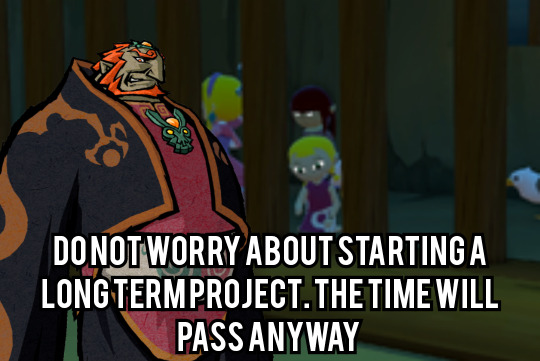
#disclaimer do not. kidnap children that is not a constructive long term project#loz#tloz#the legend of zelda#ganondorf#good advice ganondorf#good advice
504 notes
·
View notes
Text
Baby Bird Advices
When a person is facing a difficult moment, or having to make a though decision. The voice of their soulmate will manifest in their head. It's not their actual voice though, it's the voice of the child they were once, which can be confusing because people change over time.
Sometimes all someone needs is a kid scolding them or telling them to take a break; After all, they don't lie to make you feel better but try their best to support you.
However, Jason's soulmate wants a refund, little Robin is definitely not trying his best. He suggested steal the tires of a car once!
Danny didn't know his soulmate's name, one day the boy proudly declared his name was "Robin" which couldn't be a real name, but he assumed it worked. Little Robin gave worrisome advice.
Honestly, Little Robin remained silent for most of his life, sometimes he complained about his parents or his living conditions, but he didn't go further than that.
When he was a child it was a surprise to discover Little Robin, at that time the voice had no name but at the age of 5 he advised him to run, and well, it worked. Robin had a lot of advices on running away, or how to survive on little food, which was extremely helpful considering his... living conditions.
Although the halfa was very worried about the future of the child, he knew the voice of his soulmate would still be there even if they died, Little Robin was still alive? Would he be okay? How did he know so many worrying things? And why did he consider it was a good idea to tell him what to do?
On the other hand, Jason has tried to shut the little Dick in his head from making jokes during his most tense moments. Although he is stupidly helpful, and his knowledge of chemistry helped him on more than one occasion (how did a kid know about chemistry and mechanics, what the fuck?)
#DPxDC#dpxdc#Imagine little Jason just telling Danny what to do#And sometimes is really useful#but other times Danny is just worried#What if his soulmate is in jail#it wouldn't surpirse him#Jason is absolutely done with Baby Danny's jokes#some advices are useful#Like the advice of how to disarm a bomb#on the other hand how the fuck his soulmate knew that#The voices can vary in age#but usually remain in children or upset teenagers#It depends a bit on what you need#the only requirement is that your Soulmate lived that age#dead on main#dp x dc crossover#prompt#Ooo you can go the other way#with the inner kid voice being able to reach adulthood#But since they both died young their voices stay at that age#And that makes them think their soulmate is dead#just imagine little bubbly voices with the worst advices possible#soulmate au#dc x dp
1K notes
·
View notes
Note
Hi i recently adopted a 6 year old childrens python and shes going into her first shed with me and my first shed as a snake owner and im wondering if theres anything i can do to help her, what i should expect during the shed that i may not have already learnt about, how long it will likely last etc :) thank you and welcome back!
Congratulations, that's so exciting! First sheds are big milestones, and a shed that goes well is a great indicator that your husbandry is spot-on.
The biggest thing to be sure of: make sure you bump up your humidity! About a 15% increase is a good go-to; I find my Children's python sheds the most cleanly at around 70% humidity. It's always a good idea to provide a humid hide for your snake, too. They're very easy to make - find a plastic container big enough for your snake to fit inside, cut a door in the lid, fill it with damp moss, and you're done! Humid hides provide your snake with an area that's close to 100% humidity so they can easily get a needed boost during a shed cycle.
Even if she'll eat, I find it's always best to avoid offering food during a shed. Many snakes will refuse food when they're in a shed cycle anyway, but eating uses up essential moisture that they need for shedding. Some snakes are better at multi-tasking than others, but I prefer not to risk it!
As for what to expect: you'll notice distinct phases during the shed, and this is completely normal. The most noticeable phase is when your snake's scales will visibly dull and her eyes will look blue and cloudy - this is the part where she's forming a layer of fluid between her old set of scales and the new. Shortly after, she'll clear up and look very close to her old self (albeit a bit more wrinkly than normal), and that just means she's getting ready to shed. Some people panic when their snake looks back to normal but they can't find a shed, but it's perfectly normal for this stage to last a few days. Every snake is different in how long they take to shed, but expect the whole cycle to last around 2 weeks or so.
I hope it all goes well!
130 notes
·
View notes
Text
The lighthouse keeper
Entry 1
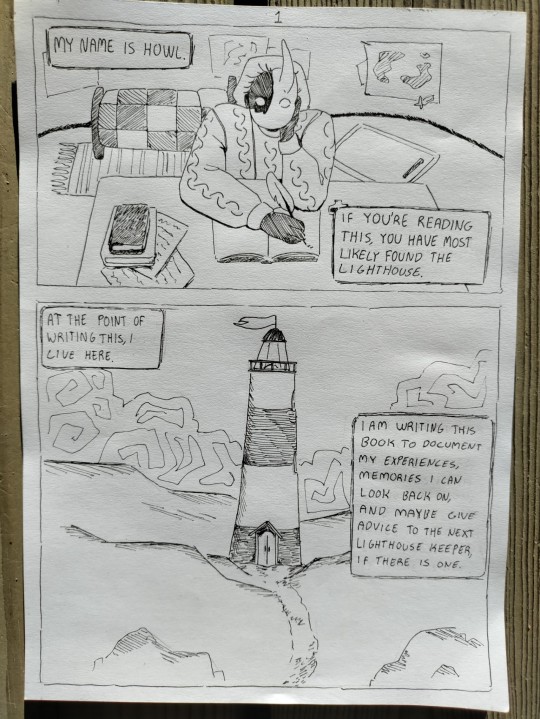
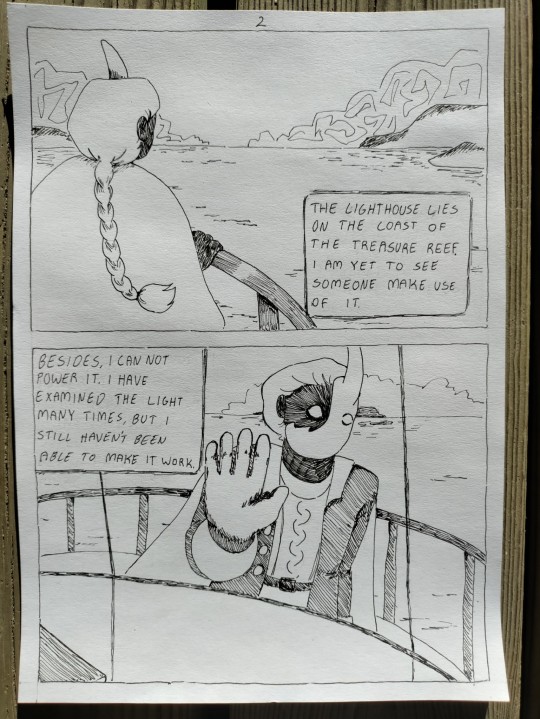
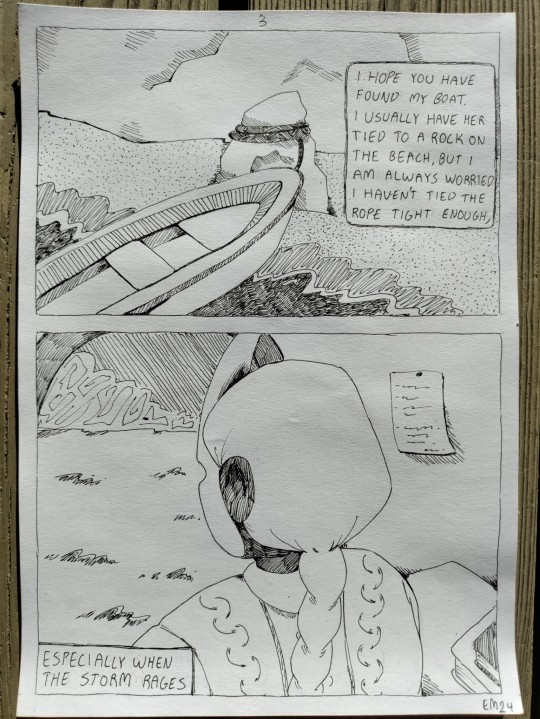
(click for better quality please. I spent a lot of time on this)
Entry 2
#anyone interested in some oc lore???#either way you'll get some!#this is my first time making a comic so of anyone has advice feel free to give me some#i will probably make more of this so i'll give it a tag#the lighthouse keeper#sky cotl#sky children of the light#sky: cotl#thatskygame#art#that sky game#original art#oc art#lineart
93 notes
·
View notes